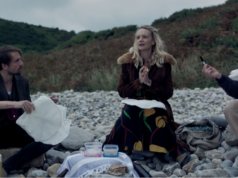Saving Mr. Banks is a lie. I don’t mean in the film-school sense that all movies (even documentaries) are fictions constructed by an author. No, this bland period drama is an aggressive attempt by the Disney Corporation to whitewash its own history. That would sink this movie even if it were much more entertaining than it actually is.
The bulk of the story takes place in 1961, when strapped finances force English author P.L. Travers (Emma Thompson) to listen to the insistent overtures of Walt Disney (Tom Hanks), who wants to make a film out of her novel Mary Poppins. Mrs. Travers — she insists on everyone addressing her as such — agrees to travel to Hollywood to consult on the adaptation, and, not yet having signed over the rights to her book, she uses the leverage for all it’s worth. In California, she immediately sets to bitching about Los Angeles’ weather, nitpicking the script’s stage directions, demanding the firing of Dick Van Dyke, and running roughshod over screenwriter Don DaGradi (Bradley Whitford) and songwriters Richard and Robert Sherman (Jason Schwartzman and B.J. Novak). It’s up to Walt, who intuits that she’s looking for a way out, to convince her to sign.
The movie’s closing credits include an audio recording from Travers’ real-life sessions with the filmmakers that reveal what a difficult collaborator she was. It does not include this piece of reality: Travers detested the film of Mary Poppins and was so embittered that, decades later, when Cameron Mackintosh mounted a stage musical that was more faithful to her weird, dark, obscurantist novel, she stipulated in her contract that no Americans be involved with the production.
Instead of dealing with this, Saving Mr. Banks depicts her as an old grump who needs to lighten up and listen to the wise advice of the guy with all the money. When she does, she’s rewarded with a seat at the premiere of Mary Poppins, where she’s moved to tears of joy by the sight of Julie Andrews setting things right and floating away on her umbrella. Maybe it’s too much to expect a Disney movie to dish dirt on the studio’s history, but this is straight-up propaganda, the kind that you usually see practiced by foreign dictators.
On top of all this, director John Lee Hancock (The Blind Side) pads this out with extensive and unenlightening flashbacks to Travers’ childhood in a backwater Australian town. A heavyweight cast (including Colin Farrell, Paul Giamatti, and Rachel Griffiths) goes down under his direction. The only actor who emerges with any credit is Hanks, who beautifully delivers the climactic monologue, when Walt rescues everything by visiting Mrs. Travers’ house in London and telling her about how the themes in her book resonate with him because of his own rough childhood.
This is nice, but it doesn’t come close to keeping this movie from being an outright fraud. The fraudulence reaches its peak when DaGradi and the Shermans win over Mrs. Travers by revising their script and getting her to join in a chorus of the final song from Mary Poppins. Watching that, I felt like telling this movie to go fly a kite.
[box_info]
Saving Mr. Banks
Starring Emma Thompson and Tom Hanks. Directed by John Lee Hancock. Written by Kelly Marcel and Sue Smith. Rated PG-13.
[/box_info]












